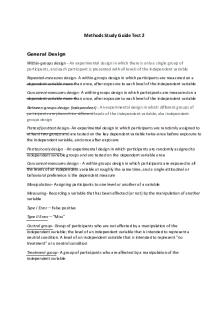Human Cultural Diversity Test 2 Study Guide PDF

| Title | Human Cultural Diversity Test 2 Study Guide |
|---|---|
| Course | Human Cultural Diversity |
| Institution | Sacred Heart University |
| Pages | 2 |
| File Size | 59.8 KB |
| File Type | |
| Total Downloads | 2 |
| Total Views | 178 |
Summary
Test 2 ANT-110 Study Guide...
Description
Anthropology Test 2 Study Guide; Band: oldest and simplest form of political organization; typical form of socio-political organization found in hunters and gatherers. Small, mobile populations who do not have formal leadership roles.
Simple Bands: hunted non-migratory animals, informally led by the eldest male of one or a few extended families, leaders led by consensus
Economics: production of food and other products that people need and want
Three Processes Involved in Making a Living 1. Turning resources into products 2. Consumption of products 3. Exchange
Reciprocity: the exchange of goods and resources without using money
Generalized Reciprocity: the exchange of gifts without the expectation of any return gift at any specific time. The donor will keep on giving even though it may not be possible for the recipient to reciprocate for a very long time. It occurs between close relatives and it is the dominant form of exchange in hunter gatherer societies
Balanced Reciprocity: the donor expects a return of relatively equal value soon or at some specified future time. It does not necessarily occur between close relatives and the donor may try to impose sanctions if the gift is not reciprocated. It is characterized by an absence of bargaining between the parties.
Negative Reciprocity: is like market exchange without using money. It can take the form of barter (bargaining). It is motivated by the desire to obtain material goods at minimal costs.
Redistribution: the collection of resources by a centralized authority who then redistributes them in ways that are beneficial to all.
Tribute: example of redistribution; the practice of subjects contributing goods to the chief who decides how to redistribute them
Market Exchange: dominant form of exchange in industrial societies.
Market Exchange requires: 1. money or some kind of currency 2. private ownership of property and other goods 3. prices are determined by the law of supply and demand
Market Economy: an economy that is organized around market principles - Market principles include:
1. the fact that nearly all privately-owned goods and services are bought and sold 2. most people make their living selling their labor or goods on the market 3. supply and demand determine the allocation the factors of production
Political Systems: organize and direct the collective actions of a society
Basic forms of Political Organization: 1. Bands 2. Tribes 3. Chiefdoms 4. States
Composite Bands: Mainly hunted migratory game animals such as bison or caribou, headed by "Big Men" who were leaders of larger groups of people composed of several unrelated extended families; "Big Men" led by persuasion and were not formal leaders with any real authority
Tribes: formally organized institutions that united scattered communities; egalitarian (like hunters and gatherers); tribes leaders relied on persuasion and consensus; leadership roles not hereditary life chiefdoms
Chiefdoms: highly centralized and formal political systems; ranked societies; chiefs led by decree and had political as well as religious power; role of chief was hereditary and usually fell to eldest son; redistribution was important form of economic exchange
State: day to day governing carried out by bureaucracy; multiethnic population; market economy; kinship no longer important organizing role of society; highly stratified into minimally elites, commoners, and slaves; where differences in power and access to resources were very great and where these classes were endogamous; upward mobility was almost nonexistent...
Similar Free PDFs

Test 2 Study Guide
- 7 Pages

Study Guide, Test 2
- 14 Pages

Study Guide Test 2
- 15 Pages

Cultural Diversity - Essay
- 2 Pages

Unit 2 Test Study Guide
- 5 Pages

Philosophy Test 2 study guide
- 8 Pages

Psych Test #2 study guide
- 6 Pages

Methods study guide test 2
- 5 Pages

CHD4630 Study Guide Test 2
- 5 Pages

Anatomy Test 2 Study Guide
- 5 Pages

Biol101 Test 2 Study Guide
- 4 Pages

Patho Test 2 Study Guide
- 27 Pages
Popular Institutions
- Tinajero National High School - Annex
- Politeknik Caltex Riau
- Yokohama City University
- SGT University
- University of Al-Qadisiyah
- Divine Word College of Vigan
- Techniek College Rotterdam
- Universidade de Santiago
- Universiti Teknologi MARA Cawangan Johor Kampus Pasir Gudang
- Poltekkes Kemenkes Yogyakarta
- Baguio City National High School
- Colegio san marcos
- preparatoria uno
- Centro de Bachillerato Tecnológico Industrial y de Servicios No. 107
- Dalian Maritime University
- Quang Trung Secondary School
- Colegio Tecnológico en Informática
- Corporación Regional de Educación Superior
- Grupo CEDVA
- Dar Al Uloom University
- Centro de Estudios Preuniversitarios de la Universidad Nacional de Ingeniería
- 上智大学
- Aakash International School, Nuna Majara
- San Felipe Neri Catholic School
- Kang Chiao International School - New Taipei City
- Misamis Occidental National High School
- Institución Educativa Escuela Normal Juan Ladrilleros
- Kolehiyo ng Pantukan
- Batanes State College
- Instituto Continental
- Sekolah Menengah Kejuruan Kesehatan Kaltara (Tarakan)
- Colegio de La Inmaculada Concepcion - Cebu



